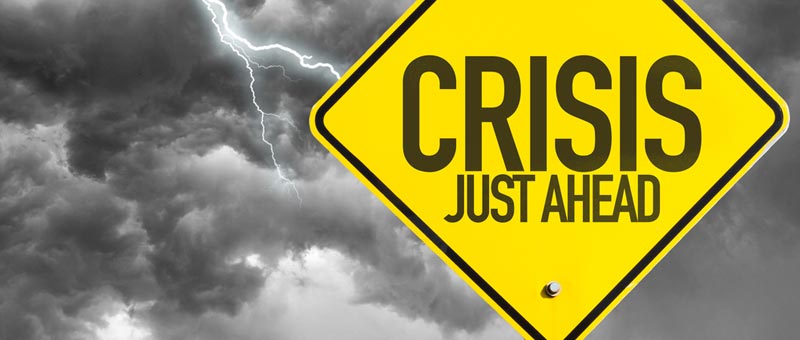Are You Ready for a Crisis?

March 1, 2016
It’s easy to become complacent in a non-crisis environment. But don’t get caught off guard. Don’t think it can never happen to you because it can. Look at Volkswagen, FIFA, Ashley Madison, Malaysia Airlines, Subway, the NFL and so many more. The time to prepare for a crisis is before it hits. That’s when you can think calmly and clearly.
Communication missteps damage your reputation.
Most organizations have crisis management plans. They have protocols, policies and procedures for things like stopping assembly lines, shutting down distribution channels or evacuating buildings. In an emergency, they know what to do. But often, they don’t know what to say or how and when to say it. When it comes to communication, in particular talking to the media, preparation is overlooked. And, missteps can sometimes cause more damage than the crisis itself. After all, it’s your reputation that’s at stake. Here are some measures to improve your response.
Start with a Crisis Audit.
We all know that the best crisis management is to avert the crisis in the first place. When doing a crisis audit, identify all potential crises. Think beyond the obvious and include all the scenarios that give you nightmares. Determine how likely they are to happen. Assess what damage could result.
Research shows that some crises can escalate over time and some show warning signs. The key is to recognize them and nip them in the bud. If you find nothing to improve… great! But if you need to make changes, make them because even if you follow all the rules of damage control, you could find yourself in a no-win situation especially with the media if it’s a crisis that could have been avoided or prevented.

Put together a Crisis Team.
Select your team in advance. Choose a varied group that represents all key areas of your organization. If there are changes in personnel, make sure that replacements are apprised of their role on the crisis team. And, choose a media spokesperson to speak on your behalf. During a crisis, the public and the media usually want to hear from the people in charge, not the public relations department.
Ensure all members of the crisis team have proper contact information and that they can all be reached easily and quickly. A crisis doesn’t always happen when everyone is in the office down the hall. You need to be able to reach everyone on the team whether it’s the middle of the night or a Sunday afternoon.
During a crisis, there is often a struggle between the lawyers and the communicators. For example, the communicators understand the need to be forthcoming with the media while the lawyers tend to be cautious. If there is disagreement, it should be addressed and everyone should know who is in charge. The chain of command needs to be clear. In a crisis, the last thing you want is in-fighting. Mixed messages can only fuel the fire among employees and other stakeholders. And, if the media get wind of discord, be sure that this will become a key element of their coverage.
Create a Crisis Communications Plan.
This plan outlines how you would respond in the event of a crisis and how you would communicate with all your audiences. The key is to have your plan written and approved in advance. It’s also critical that everyone agrees to follow the plan. Ask yourselves exactly how, when, how often and to whom you’ll disclose information. People often ask me about generic templates. These are okay as a starting point, but plans work best if they are very specific.
You don’t want to be scrambling when you’re trying to formulate strategy so prepare the basics in advance. Your plan should include an up to date media list, contact information for your news release distributor, models for initial news releases, media statements and key messages based on the scenarios determined by your crisis audit. If they’re not a component of your online newsroom, you should include backgrounders, fact sheets and Q&As on your organization as well as all relevant issues. And, don’t forget blueprints for letters, emails and phone messages that you might need for employee and stakeholder communications.
Logistics are important.
Your plan should specify how you will pull together adequate staff, equipment and facilities. Might you need a “hot-line” to make it easier for people to reach you? How will you monitor media coverage? Who will handle your social media platforms? If for some reason your offices cannot be used as command central, do you have an alternate location to use during the crisis?
Make sure your website can handle a sudden increase in volume of traffic without crashing. Do you have personnel to keep the site up to date? You don’t want to be caught advertising your products or services with no mention of the crisis. Another thing to consider is a dark site that would replace your website in the event of a crisis.
Test your plan.
Once you have a plan, it’s important to practice to see if it works and if it needs tweaking. “How would we handle this” discussions can be helpful. And, if you undertake crisis simulations, make sure that communicating with stakeholders and the media is included in the drill. Don’t let your plan sit on the shelf and collect dust. Review and update it regularly.
You hope you’ll never need to call your crisis team together or implement your crisis communications plan, but having everything in place will give you peace of mind. If you plan and prepare now, you’ll be ready to respond more quickly and effectively when a crisis hits. And, don’t underestimate the value of hiring a professional communicator to help you craft your plan. Protect your reputation. Prepare for the worst.


